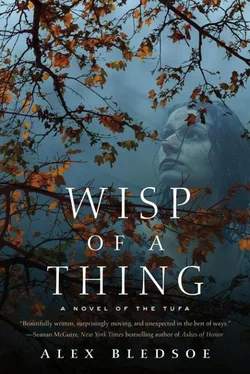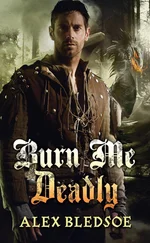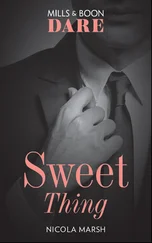The room brought him up short. Lace edged everything, from the writing desk to the telephone receiver. Little painted animals in overalls and straw hats ran along the baseboard, and the bed sported an enormous canopy and a huge, thick mattress. When Rob tossed his guitar on the bed, it bounced a foot into the air.
“That looks comfortable,” he observed.
“We don’t get many single young men coming through,” she said. “Usually couples.”
“I bet they appreciate that.”
She handed him the key. “I hope you enjoy your stay with us and manage to get some rest. There’s a café menu on your desk. Local calls are free, although Lord knows who you’d call around here. But you’ve probably got one of those fancy picture-taking cell phones anyway.” As she went out, she added cheerily, “If you need anything, just holler. I’m usually in the office behind the desk during the day, and my husband and I live out back.”
“Thanks. I should be fine for tonight.” As she turned away, he added, “Did you know you have wild emus around here?”
“Yes,” she said with disgust. “They used to belong to old Sim Denham. He bought a whole gaggle of the nasty things. Thought he’d make a fortune with them. Then the bottom dropped out of the market and he just let ’em go. Now the darn things are everywhere.”
“I nearly ran over one today. Are they dangerous?”
“No, but they give me the whim-whams the way they just stare at you.” She shivered. “Well, if you need anything, you just let me know.”
Rob closed the door after her, and noticed an odd wooden device mounted to it. It looked like the neckless body of a tiny mandolin or guitar, with four strings stretched across the hole. Small wooden balls hung so that they’d strike these strings whenever the door closed. It made a soft, comforting sound.
He cleared the complimentary stationery and postcards from the desk and placed his laptop on it. As he waited for it to find the network, he took in more details, like the small fireplace in the corner and the lack of a television. On the wall over the desk hung a framed cross-stitched quote attributed to William Blake:
GREAT THINGS ARE DONE WHEN MEN AND MOUNTAINS MEET.
It was stuffy in the room, so he opened the window. His view looked out at the woods, which grew thick on the slope of a rising hillside, giving him only a limited view of the sky. A small piece of irregular blue glass lay discarded on the sill. He tossed it in the trash can by the desk, then sat down to check his e-mail.
He was startled to see, not his Gmail account, but the Tufa Mysteries Web site. He forgot he’d made it his home page just before he left Kansas. The splash page featured the classic vintage picture of these enigmatic people, the one in every book, article, or blog. It was black-and-white, scratched and faded with age, but sharp with the detail those old huge cameras captured. Three women held their babies and stood grim-faced before a rough-edged mountain cabin. In front of them, three men sat in straight-backed chairs; they clutched a rifle, a guitar, and a windup phonograph, respectively. They looked like European Gypsies: dark skin, straight black hair and eyes haunted by mistrust. Yet the caption read, “Gorvens family, Cloud County, TN, 1898.”
This picture—the original was held in the Museum of Appalachia archives—was the touchstone for anyone interested in the Tufa mystery. Rob had seen the same photo in many other books, often with conflicting information about its origin. About the only thing the different sources agreed on was the family’s surname, Gorvens, and that the clan had vanished into the mountains shortly after they’d been convinced to sit for the photo, never to be seen again by the outside world.
The guitar in the photo had first caught his attention as he surfed Web sites on music history late one sleepless night. Most sources insisted guitars weren’t generally used by the mountain folk until after 1910, yet here was one, in a blatantly musical context, at least twenty years earlier. The picture tangentially confirmed part of the sequined man’s story, enough to convince Rob he should make the pilgrimage.
After reading about the Tufa into the wee hours, the idea that he might just throw things in a car and head south struck him as he stared at the ceiling. Why the hell not? He had money, and time. If the tale of heart-healing magical music turned out to be bullshit, which Rob knew had to be the case, he’d at least get a change of scenery, which God knew he needed. And if it were true…
He glanced at his reflection in a small mirror across the room and compared it to the faces in the photograph. There was a general resemblance, but these Gorvens had something in their eyes entirely missing from Rob’s. It was too vague and insubstantial for him to name, but its reality was unmistakable, like seeing a shadow but not the thing casting it.
He logged on to Facebook and updated his status. This was his personal page, with fewer than two hundred friends. His “Like” page had more than twenty-five million. He never even looked at it now; twenty-five million messages of sympathy and condolences just left him numb.
Arrived in Needsville today, he typed.
My car broke down, but one of the locals helped me out. Here’s a quote from my official Tennessee guidebook that really captures the feel of the place: “Nestled in the northeast corner of the state, deep in the Smoky Mountains, the area’s rugged landscape features many high ridges and narrow valleys that remain mostly untouched by the modern world.” And I tell you, it’s the truth. It’s like entering another world, similar to ours but with small, subtle surprises. Like this.
Then he posted the photo of the emu.
He closed the computer and took out his guitar. Seated on the edge of the bed, he softly played one of the tunes he’d written after passing through Erwin, a town noted for a bizarre incident in which a killer circus elephant was hanged with a railroad crane. It was his latest attempt at a true folkish story-song, and although it was awful (he rhymed “elephant” with “the hell it can’t”), he understood that it was a step on the road to competence.
But, as with everything he wrote these days, that song morphed into another, one of many he’d written about Anna. He sang softly, feeling the rhythm of the words link inextricably with the melody.
All the screaming girls
Said they love me
All the screaming girls
Said they want me
All the screaming girls
Fade into the dark
And I’m the one screaming
For you.
He yawned, and realized he was thoroughly exhausted even though it was barely lunchtime. He’d left the Cookville motel before dawn, and now could not keep his eyes open. He leaned back on the bed, intending to just shut his eyes for an instant, and didn’t even put his guitar away. He was asleep in moments.
* * *
Peggy’s husband, Marshall, came in from the back carrying a box of disposable coffee filters. “You ain’t never gonna guess who’s upstairs right now,” his wife said.
He put down the box on the front desk and looked at her. “That’s likely.”
“Well, go ahead, guess.”
“You said I ain’t never gonna be able to.”
“That doesn’t mean you shouldn’t try.”
“I don’t know. Kevin Sorbo.”
“Kevin Sorbo? Where’d that come from?”
“Can you just tell me? I have a bunch of stuff to unload.”
“Rob Quillen.”
“You’re right, I never would’ve guessed that. Who’s Rob Quillen?”
“That poor boy from So You Think You Can Sing? His girlfriend was flying out to surprise him at the final show, and her plane crashed?”
Читать дальше











